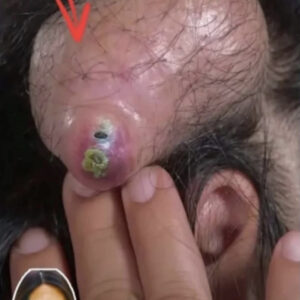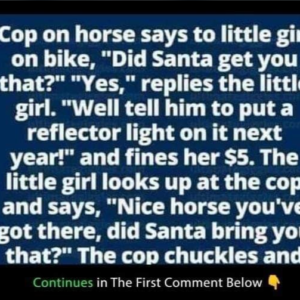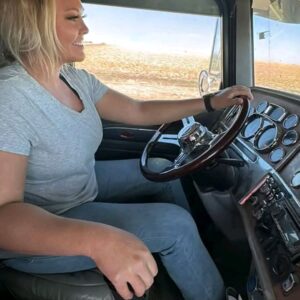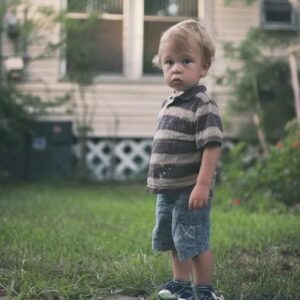As I was busy cleaning up the kitchen, the doorbell suddenly rang. Not just any ring, but one that hinted at impatience, even a touch of aggression—like someone was about to share some troubling news. I stopped for a moment, dish towel in hand, feeling a sudden flutter of unease in my chest. My four-year-old son, Jack, was finally settled in for his afternoon nap upstairs, and the last thing I needed was any noise to disturb him.
I tossed the dishrag onto the counter and made my way to the front door. I imagined all sorts of scenarios: perhaps a neighbor stopping by unexpectedly, or maybe there was some mix-up with a delivery. As I swung the door open, the sight of the man standing there instantly revealed that he was anything but ordinary.
There was a certain roughness to him, a sense that life had knocked him around more often than not. He appeared to be in his late fifties, wearing a worn baseball cap pulled down low, his face marked by the sun and the years, and a crooked smile that lacked any warmth. He glanced around my entrance hall, absorbing the marble floors, the sparkling chandelier, and the subtle yet unmistakable hints of a life well-lived.
Then he focused on me, his smile stretching in a way that sent chills down my spine. “Lily,” he said, his voice rough yet oddly familiar, as if we shared a long history—despite my complete lack of recollection of him. “It’s me.” Your dad.
For just a moment, I questioned whether I had misunderstood him. “I’m… sorry?”“I got through it, though confusion knotted in my throat.”
He took off his cap and ran a rough hand through his thinning, graying hair. “Your father,” he said again, this time raising his voice. “You don’t remember who I am?”“
I took a deep breath, my fingers tightening around the doorframe. I couldn’t think of anything. Dad? I had a father, but he was more of a distant memory—an elusive presence from my childhood who disappeared from my life long ago, leading me into the foster system. The family that took me in provided a solid foundation, yet the feeling of being abandoned lingered with me. “No,” I finally replied, my tone devoid of emotion. “I really don’t know you.”
The man—could it be my father?—shrugged casually, as if it didn’t matter. “That sounds reasonable.” I’m not here to exchange niceties. “I’m here to take back what belongs to me.”
His words sent a wave of unease through me. “Claim?” Who are you, really?”
He stood up straight, that familiar crooked grin making a comeback. “I’m Harlow.” Does that sound familiar?”
My stomach twisted in knots. Harlow—this name from the dusty old orphanage files, the father who had let me go, had put me into a system that I recall as a never-ending stretch of dim hallways and restless nights. When I turned thirteen, my adoptive parents shared a cleaned-up version of the story with me, just enough to understand that Harlow wasn’t someone who stayed in one place for long. A stranger stood on my doorstep, radiating a sense of smug entitlement.
He stepped forward confidently, crossing the line, and I had to lean in to keep him from coming in. “I heard you’ve been doing great, Lily,” he said, his voice laced with a hint of pride. “Great house, great car.” Married, with a child, enjoying the good life. I thought it was finally time for you to share some of that good luck.
I blinked, my heart racing as I grasped the menacing undertone in his words. “I’m not quite sure what you mean,” I replied cautiously.
“Oh, come on, don’t act like you don’t know.” He looked around once more, clearly enjoying the fancy surroundings. “You know, if it weren’t for me, you wouldn’t even be here.” If things had been different, you might not have found yourself in foster care or eventually being adopted by a family with means.




